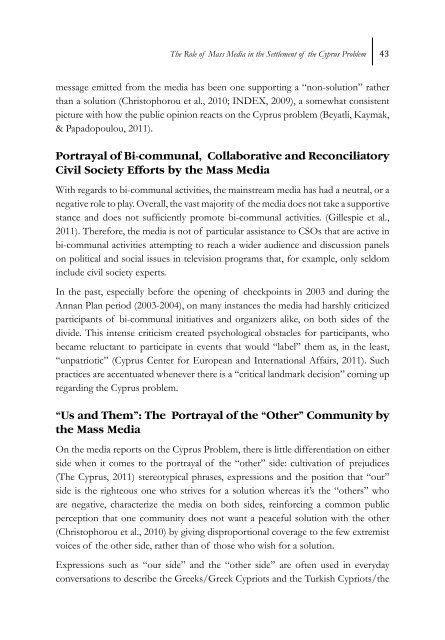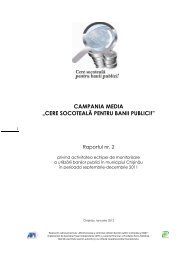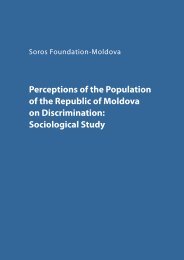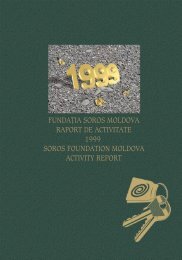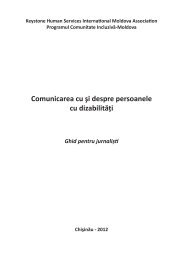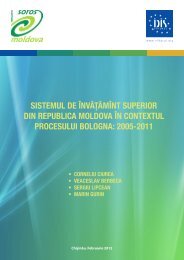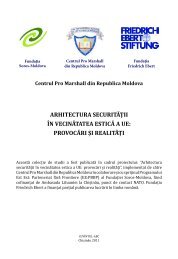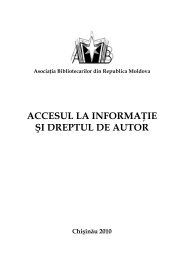Managing Intractable Conflicts: Lessons from Moldova and Cyprus
Managing Intractable Conflicts: Lessons from Moldova and Cyprus
Managing Intractable Conflicts: Lessons from Moldova and Cyprus
Create successful ePaper yourself
Turn your PDF publications into a flip-book with our unique Google optimized e-Paper software.
The Role of Mass Media in the Settlement of the <strong>Cyprus</strong> Problem<br />
43<br />
message emitted <strong>from</strong> the media has been one supporting a “non-solution” rather<br />
than a solution (Christophorou et al., 2010; INDEX, 2009), a somewhat consistent<br />
picture with how the public opinion reacts on the <strong>Cyprus</strong> problem (Beyatli, Kaymak,<br />
& Papadopoulou, 2011).<br />
Portrayal of Bi-communal, Collaborative <strong>and</strong> Reconciliatory<br />
Civil Society Efforts by the Mass Media<br />
With regards to bi-communal activities, the mainstream media has had a neutral, or a<br />
negative role to play. Overall, the vast majority of the media does not take a supportive<br />
stance <strong>and</strong> does not sufficiently promote bi-communal activities. (Gillespie et al.,<br />
2011). Therefore, the media is not of particular assistance to CSOs that are active in<br />
bi-communal activities attempting to reach a wider audience <strong>and</strong> discussion panels<br />
on political <strong>and</strong> social issues in television programs that, for example, only seldom<br />
include civil society experts.<br />
In the past, especially before the opening of checkpoints in 2003 <strong>and</strong> during the<br />
Annan Plan period (2003-2004), on many instances the media had harshly criticized<br />
participants of bi-communal initiatives <strong>and</strong> organizers alike, on both sides of the<br />
divide. This intense criticism created psychological obstacles for participants, who<br />
became reluctant to participate in events that would “label” them as, in the least,<br />
“unpatriotic” (<strong>Cyprus</strong> Center for European <strong>and</strong> International Affairs, 2011). Such<br />
practices are accentuated whenever there is a “critical l<strong>and</strong>mark decision” coming up<br />
regarding the <strong>Cyprus</strong> problem.<br />
“Us <strong>and</strong> Them”: The Portrayal of the “Other” Community by<br />
the Mass Media<br />
On the media reports on the <strong>Cyprus</strong> Problem, there is little differentiation on either<br />
side when it comes to the portrayal of the “other” side: cultivation of prejudices<br />
(The <strong>Cyprus</strong>, 2011) stereotypical phrases, expressions <strong>and</strong> the position that “our”<br />
side is the righteous one who strives for a solution whereas it’s the “others” who<br />
are negative, characterize the media on both sides, reinforcing a common public<br />
perception that one community does not want a peaceful solution with the other<br />
(Christophorou et al., 2010) by giving disproportional coverage to the few extremist<br />
voices of the other side, rather than of those who wish for a solution.<br />
Expressions such as “our side” <strong>and</strong> the “other side” are often used in everyday<br />
conversations to describe the Greeks/Greek Cypriots <strong>and</strong> the Turkish Cypriots/the


